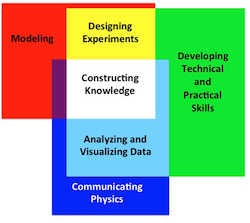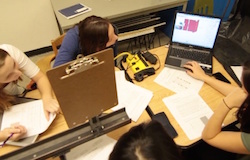labs Recommendations
5 Recommendations are tagged with "labs"

How can I improve labs?
March 11, 2025 by Stephanie Chasteen, University of Colorado BoulderThese quick tips from the Faculty Teaching Institute can be used to make labs more effective.
Faculty Teaching Institute, labs

How do I design introductory physics labs to meet specific goals?
December 21, 2023 by N. G. Holmes, Laboratory of Atomic and Solid State Physics and the Department of Physics, Cornell UniversityThere are a lot of things going on in a lab: from handling equipment, analyzing data, coordinating data with relevant physics ideas, to communicating results and working in a team. How do you decide what goals to focus on and what kinds of activities are best suited to those goals?

Which laboratory skills research-based assessment should I use in my class?
April 10, 2021 by Adrian Madsen, Sarah B. McKagan, Eleanor C. Sayre, and Cassandra A. PaulThis article discusses and compares 4 research-based assessments on lab skills to help you choose one to use in your course.
concept inventories, research-based assessment, labs

I suddenly have to move my lab course online! What should I do?
March 25, 2020 by Linda Strubbe and Sam McKagan, PhysPortIn the wake of COVID-19, many faculty are being asked to quickly shift their lab classes online. We are sharing with you ideas and resources that align with research-based pedagogical principles, research-validated resources for teaching labs online, and ideas that colleagues are trying as they make this transition.

What are some tips for using PhET in a lab setting?
June 28, 2016 by Stephanie ChasteenPhET simulations are free, online interactive simulations for teaching and learning science. The simulations emphasize visual models, cause-and-effect relationships, and multiple representations. Using PhET in a lab setting has many benefits, such as allowing new possibilities for experiments (such as quantum mechanics), quick repeatability, and making visible the underlying mechanisms.
active learning, PhET Interactive Simulations, labs, recitation



